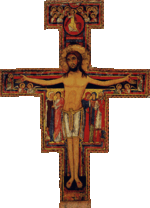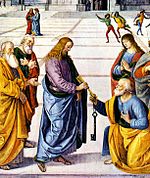- Pope Clement IV
-
Clement IV Papacy began February 5, 1265 Papacy ended November 29, 1268 Predecessor Urban IV Successor Gregory X Personal details Birth name Gui Faucoi le Gros Born November 23, year uncertain (between 1190 and 1200)
Saint-Gilles-du-Gard, Languedoc, FranceDied November 29, 1268
Viterbo, Papal States, Holy Roman EmpireOther Popes named Clement Papal styles of
Pope Clement IV
Reference style His Holiness Spoken style Your Holiness Religious style Holy Father Posthumous style None Pope Clement IV (Saint-Gilles-du-Gard, November 23, ca. 1195 – November 29, 1268 in Viterbo), born Gui Faucoi called in later life le Gros (Guy Foulques the Fat; Italian: Guido Fulcodi il Grosso), was elected Pope February 5, 1265, in a conclave held at Perugia that took four months, while cardinals argued over whether to call in Charles of Anjou, the youngest brother of Louis IX of France (1226–70), to carry on the papal war against the last of the house of Hohenstaufen.
Contents
Biography
Guy had been an unlikely candidate for holy orders: widowed and the father of two young women before taking orders, he had been successively a soldier and a lawyer, and in the latter capacity had acted as secretary to Louis IX of France, to whose influence he was chiefly indebted for his elevation to the cardinalate. Upon the death of his wife, he followed his father's example and gave up secular concerns for the Church. His rise in the church was rapid: in 1257, he was Bishop of Le Puy, in 1259, Archbishop of Narbonne and in December 1261, he was the first cardinal created by Pope Urban IV (1261–64), in the see of Sabina. He was the papal legate in England, 1262–64. He was named grand penitentiary in 1263.
At this time the Holy See was engaged in a conflict with Manfred, the illegitimate son and designated heir of Frederick II of Hohenstaufen, but whom papal loyalists, the Guelfs, called "the usurper of Naples". Clement IV, who was in France at the time of his election, was compelled to enter Italy in disguise. He immediately took steps to ally himself with Charles of Anjou, his erstwhile patron's brother, the impecunious French claimant to the Neapolitan throne. Charles allowed the Pope to be his feudal overlord (a bone of contention with the Hohenstaufen) and was crowned by cardinals in Rome, where Clement IV, permanently established at Viterbo, dared not venture, the Ghibelline party was so firmly in control. Then, fortified with papal money and supplies, Charles marched into Naples. "Papal legates and mendicant friars appeared upon the scene, preaching a formal crusade, with the amplest indulgences and most lavish promises" (Catholic Encyclopedia). Among the Italians who failed to see any nobler crusading purpose in the conflict was Dante (Inferno, Canto xxvii). Having defeated and slain Manfred in the great Battle of Benevento, Charles established himself firmly in the kingdom by the conclusive Battle of Tagliacozzo, in which Conradin, the last of the house of Hohenstaufen, was taken prisoner. Clement IV is said to have disapproved of the cruelties committed by his protégé, and there seems no foundation for the statement by Gregorovius that Clement IV became an accomplice by refusing to intercede for the unfortunate Conradin whom Charles had beheaded in the marketplace of Naples.
Within months Clement IV was dead too, and buried at Viterbo. Owing to unbridgeable divisions among the cardinals, the papal throne remained vacant for nearly three years.
Clement IV's private character was praised by contemporaries for his asceticism, and he is especially commended for his indisposition to promote and enrich his own relatives. He also ordered the Franciscan scholar Roger Bacon to write his Opus maius, which is addressed to him. He was buried at Viterbo, where he had resided throughout his pontificate.
In 1264, Clement IV renewed the prohibition of the Talmud of Gregory IX, who had it publicly burnt in France and in Italy; Clement, though he did not assign to the stake those who harboured copies of it[1] and, responding to a denunciation of the Talmud by Pablo Christiani,[2] assigned a Talmud censorship committee and, ordered that the Jews of Aragon submit their books to Dominican censors for expurgation.[3]
In 1267–1268 Clement engaged in correspondence with the Mongol Ilkhanate rule Abaqa. The latter proposed a Franco-Mongol alliance between his forces, those of the West, and the Byzantine emperor, Michael VIII Palaeologos (Abaqa's father-in-law). Pope Clement welcomed Abaqa's proposal in a non-committal manner, but did inform him of an upcoming Crusade. In 1267, Pope Clement IV and James I of Aragon sent an ambassador to the Mongol ruler Abaqa in the person of Jayme Alaric de Perpignan.[4] In his 1267 letter written from Viterbo, the Pope wrote:
"The kings of France and Navarre, taking to heart the situation in the Holy Land, and decorated with the Holy Cross, are readying themselves to attack the enemies of the Cross. You wrote to us that you wished to join your father-in-law (the Greek emperor Michael VIII Palaiologos) to assist the Latins. We abundantly praise you for this, but we cannot tell you yet, before having asked to the rulers, what road they are planning to follow. We will transmit to them your advice, so as to enlighten their deliberations, and will inform your Magnificence, through a secure message, of what will have been decided."Pope Clement died in 1268, and though his successors continued to engage in diplomatic contacts with the Mongols for the rest of the century, they were never able to coordinate an actual alliance.[6]
His funerary monument is in the church of San Francesco alla Rocca in Viterbo.
Notes
- ^ As reported, for example in Arsene Damestetter, The Talmud, 1897:94..
- ^ Shlomo Simonsohn, The Apostolic See and the Jews (Pontifical Institute of Mediaeval Studies) 1991:311.
- ^ Popper, William (1889). The Censorship of Hebrew Books. Knickerbocker Press. pp. 13–14..
- ^ Runciman, p. 330–331
- ^ Quoted in Grousset, p. 644
- ^ "Despite numerous envoys and the obvious logic of an alliance against mutual enemies, the papacy and the Crusaders never achieved the often-proposed alliance against Islam". Atwood, "Western Europe and the Mongol Empire" Encyclopedia of Mongolia and the Mongol Empire, p. 583
References
- Runciman, Steven (1958). The Sicilian Vespers. Cambridge University Press. ISBN 0-521-43774-1.
- Runciman, History of the Crusades
- Grousset, Histoires des Croisades
External links
 "Pope Clement IV" in the 1913 Catholic Encyclopedia.
"Pope Clement IV" in the 1913 Catholic Encyclopedia.- "Le pape, le roy et l'alchimiste : Clémént IV – saint Louis – Roger Bacon" by Laurent Ryder
Catholic Church titles Preceded by
Urban IVPope
1265–68Succeeded by
Gregory XCatholic Church Organizations, Papacy, Teachings and Liturgical TraditionsHistory Jesus · Twelve Apostles · Early Christianity · History of the Papacy · Ecumenical Councils · Missions · Great Schism of East · Crusades · Great Schism of West · Protestant Reformation · Counter-Reformation · Catholic Church by country
Hierarchy Pope · Cardinals · Patriarchs · Major Archbishops · Primates · Metropolitans · Archbishops · Diocesan BishopsTheology Sacraments Mariology Doctors of
the ChurchAlbertus Magnus · Ambrose · Anselm of Canterbury · Anthony of Padua · Thomas Aquinas · Athanasius of Alexandria · Augustine of Hippo · Basil of Caesarea · Bede · Robert Bellarmine · Bernard of Clairvaux · Bonaventure · Petrus Canisius · Catherine of Siena · Peter Chrysologus · John Chrysostom · Cyril of Alexandria · Cyril of Jerusalem · Peter Damian · Ephrem the Syrian · Francis de Sales · Gregory of Nazianzus · Gregory the Great · Hilary of Poitiers · Isidore of Seville · Jerome · John of Damascus · John of the Cross · Lawrence of Brindisi · Leo the Great · Alphonsus Maria de Liguori · Teresa of Ávila · Thérèse of LisieuxPope Benedict XVI Preceding Popes Orders and
SocietiesVatican II Particular Churches
sorted by
Liturgical TraditionsAlexandrian · Coptic · Ethiopic · Antiochian · Maronite · Syriac · Syro-Malankara · Armenian · Armenian · Byzantine · Albanian · Belarusian · Bulgarian · Croatian · Greek · Hungarian · Italo-Albanian · Macedonian · Melkite · Romanian · Russian · Ruthenian · Slovak · Ukrainian · East Syrian · Chaldean · Syro-Malabar · Latin · Roman · Anglican Use · Sarum · Ambrosian · MozarabicHistory of the Catholic Church General History of the Catholic Church · History of the Papacy · History of the Roman Curia · Catholic Ecumenical Councils · Timeline of the Catholic Church · History of Christianity · Role of the Catholic Church in Western civilization · Art in Roman Catholicism · Catholic religious order · Christian monasticism · Papal States
Church beginnings Constantine the Great to
Pope Gregory IConstantine the Great and Christianity · Arianism · Basilica of St. John Lateran · First Council of Nicaea · Pope Sylvester I · First Council of Constantinople · Biblical canon · Jerome · Vulgate · First Council of Ephesus · Council of Chalcedon · Benedict of Nursia · Second Council of Constantinople · Pope Gregory I · Gregorian chant
Early Middle Ages Third Council of Constantinople · Saint Boniface · Byzantine Iconoclasm · Second Council of Nicaea · Charlemagne · Pope Leo III · Fourth Council of Constantinople · East–West Schism
High Middle Ages Pope Urban II · Investiture Controversy · Crusades · First Council of the Lateran · Second Council of the Lateran · Third Council of the Lateran · Pope Innocent III · Latin Empire · Francis of Assisi · Fourth Council of the Lateran · Inquisition · First Council of Lyon · Second Council of Lyon · Bernard of Clairvaux · Thomas Aquinas
Late Middle Ages Protestant Reformation/
Counter-ReformationBaroque Period to the
French Revolution19th century Pope Pius VII · Pope Pius IX · Dogma of the Immaculate Conception of the Virgin Mary · Our Lady of La Salette · Our Lady of Lourdes · First Vatican Council · Papal infallibility · Pope Leo XIII · Mary of the Divine Heart · Prayer of Consecration to the Sacred Heart · Rerum Novarum
20th century Pope Pius X · Our Lady of Fátima · Persecutions of the Catholic Church and Pius XII · Pope Pius XII · Pope Pius XII Consecration to the Immaculate Heart of Mary · Dogma of the Assumption of the Virgin Mary · Pope John XXIII · Second Vatican Council · Pope Paul VI · Pope John Paul I · Pope John Paul II
21st century By country or region Brazil · Cuba · France · Germany · Hispano-America · Ireland · Japan · Mexico · Spain · United States · Venezuela
Categories:- 1195 births
- 1268 deaths
- People from Gard
- Popes
- French popes
- Diplomats of the Holy See
- Cardinal-bishops of Sabina
- Bishops of Le Puy-en-Velay
- Archbishops of Narbonne
- 13th-century Roman Catholic archbishops
- 13th-century French people
- Major Penitentiaries of the Apostolic Penitentiary
- Viterbo Papacy
Wikimedia Foundation. 2010.


